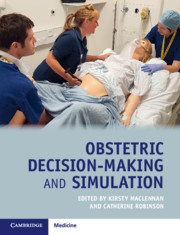Book contents
- Obstetric Decision-Making and Simulation
- Obstetric Decision-Making and Simulation
- Copyright page
- Contents
- Contributors
- Foreword
- Part 1 The Role of Simulation
- Part 2 The Impact of Human Factors in Clinical Practice
- 6 Introduction to Human Factors and Ergonomics in Obstetric Simulation
- 7 Situational Awareness, Bias and Decision-Making Styles in Obstetric Simulation
- 8 Team-Working, Communication and Use of Communication Aids and Checklists in an Emergency
- Part 3 Clinical Scenarios
- Scenario Section 1 Obstetric
- Scenario Section 2 Maternal Collapse
- Scenario Section 3 Hypertensive Disorders of Pregnancy
- Scenario Section 4 Neuraxial Analgesia
- Scenario Section 5 Non-Neuraxial Analgesia
- Scenario Section 6 General Anaesthesia
- Scenario Section 7 Haemorrhage
- Scenario Section 8 Sepsis
- Scenario Section 9 Cardiac
- Scenario Section 10 Endocrine
- Scenario Section 11 Neurological
- Scenario Section 12 Trauma
- Scenario Section 13 Neonatal
- Index
- References
7 - Situational Awareness, Bias and Decision-Making Styles in Obstetric Simulation
from Part 2 - The Impact of Human Factors in Clinical Practice
Published online by Cambridge University Press: 25 March 2019
- Obstetric Decision-Making and Simulation
- Obstetric Decision-Making and Simulation
- Copyright page
- Contents
- Contributors
- Foreword
- Part 1 The Role of Simulation
- Part 2 The Impact of Human Factors in Clinical Practice
- 6 Introduction to Human Factors and Ergonomics in Obstetric Simulation
- 7 Situational Awareness, Bias and Decision-Making Styles in Obstetric Simulation
- 8 Team-Working, Communication and Use of Communication Aids and Checklists in an Emergency
- Part 3 Clinical Scenarios
- Scenario Section 1 Obstetric
- Scenario Section 2 Maternal Collapse
- Scenario Section 3 Hypertensive Disorders of Pregnancy
- Scenario Section 4 Neuraxial Analgesia
- Scenario Section 5 Non-Neuraxial Analgesia
- Scenario Section 6 General Anaesthesia
- Scenario Section 7 Haemorrhage
- Scenario Section 8 Sepsis
- Scenario Section 9 Cardiac
- Scenario Section 10 Endocrine
- Scenario Section 11 Neurological
- Scenario Section 12 Trauma
- Scenario Section 13 Neonatal
- Index
- References
Summary

- Type
- Chapter
- Information
- Obstetric Decision-Making and Simulation , pp. 37 - 44Publisher: Cambridge University PressPrint publication year: 2019



